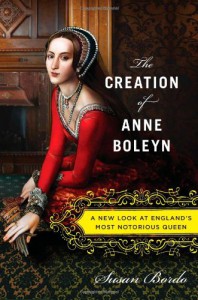me reading books
reviews - quotes - thoughts
- crossposting here and on goodreads -
Review: The Creation of Anne Boleyn

What bothered me most about „The Creation of Anne Boleyn“ was that it lacked in substance. I was expecting a theory concerning Boleyn’s image and the way representations of her have changed through the years. I would have liked something of a statement as to whether her depictions have changed and how she has been perceived, and a discussion about why she is stills so well-known and popular.
Well, that is not what this book is about. If you are already a Boleyn enthusiast, there won’t be anything new in this one for you. Actually it contains quite a lot of retelling and is fairly repetitive. There really is no coherent theory in this text.
Bordo’s tone is quite condescending at times. Attacking fellow writers like David Starkey and Alison Weir seems to be her favourite pastime. And honestly, attacking Starkey’s work for being too much on the narrative site? Really? It’s not a secret that his style reads rather personal and story-telling-like (sorry, can’t think of a better word). So, yeah, easy target. But I think Starkey deems his readers intelligent enough not to take everything he writes at face-value. Readers do not need to be told to question what they are being told. However, Bordo does think so. She criticizes Starkey and Weir for not telling their readers to be sceptical! I am not the biggest Starkey-fan on earth myself, but what Bordo does can be categorized as nit picking at best.
And if she’s not bashing Starkey, then she is gushing about the beauty and insightfulness that is Natalie Dormer (the actress that played Boleyn in “The Tudors” TV show). Yes, I get it, you met her and you loved her. Of course you loved her! She shared all your opinions on Boleyn.
Bordo also seems to believe that in medieval times sex was a very secret thing that nobody knew about. Ridiculously she believes in the ideal of courtly love depicted in chivalric poetry. I had to put down my kindle, I was laughing so hard. A sample: “This was a culture in which sexual consummation does not seem to have been the apotheosis of personal fulfillment that it was to become as physical desire replaced spiritualized, courtly constructions of “longing” in romantic love”(p.53). Ha!
Part one of the book does quite a good job at retelling the story of Anne Boleyn, I guess. But like I said, this is old news to anyone interested in her as an iconic persona. Part two is a collection of what people posted on Bordo’s facebook page and what Natalie Dormer thinks about Anne Boleyn and her portrayal of her in “The Tudors”. There is also a chapter on that show where Bordo keeps on telling you how cringe-worthy it all was but how Dormer captured Anne’s spirit so well and blah blah blah.
All in all, there is not much flesh to her theory. I am not even sure if she has one. She keeps quoting scholars and facebook friends (and Natalie Dormer) – and she reuses quotes over and over – and I got the feeling she hasn’t done much work or thinking or analysing herself. Claiming that “we really have no way of knowing” is not a really good conclusion to all those theories she keeps dismissing.
The one good point she makes is that it was not all Anne Boleyn’s fault and people tend to make the mistake of appropriating all the blame to Anne and underestimating Henry – which is weird since Henry kept up the crazy and even turned it up a notch or two long after Anne was dead.
So there, I managed to end this on a positive note.
 1
1










